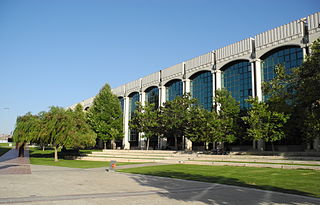
The Bodleian Library is the main research library of the University of Oxford, and is one of the oldest libraries in Europe. It derives its name from its founder, Sir Thomas Bodley. With over 13 million printed items, it is the second-largest library in Britain after the British Library. Under the Legal Deposit Libraries Act 2003, it is one of six legal deposit libraries for works published in the United Kingdom, and under Irish law it is entitled to request a copy of each book published in the Republic of Ireland. Known to Oxford scholars as "Bodley" or "the Bod", it operates principally as a reference library and, in general, documents may not be removed from the reading rooms.
A discovery system is a bibliographic search system based on search engine technology. It is part of the concept of Library 2.0 and is intended to supplement or even replace the existing OPAC catalogs. These systems emerged in the late 2000s in response to user desire for a more convenient search option similar to that of internet search engine. The results from searching a discovery system may include books and other print materials from the library's catalog, electronic resources such as e-journals or videos, and items stored in other libraries.
The online public access catalog (OPAC), now frequently synonymous with library catalog, is an online database of materials held by a library or group of libraries. Online catalogs have largely replaced the analog card catalogs previously used in libraries.

OCLC, Inc., doing business as OCLC, is an American nonprofit cooperative organization "that provides shared technology services, original research, and community programs for its membership and the library community at large". It was founded in 1967 as the Ohio College Library Center, then became the Online Computer Library Center as it expanded. In 2017, the name was formally changed to OCLC, Inc. OCLC and thousands of its member libraries cooperatively produce and maintain WorldCat, the largest online public access catalog (OPAC) in the world. OCLC is funded mainly by the fees that libraries pay for the many different services it offers. OCLC also maintains the Dewey Decimal Classification system.
Melvyl was the name of the online catalog of the University of California's library system. The Melvyl union catalog was produced by the California Digital Library — a unit within the department of Academic Planning, Programs, and Coordination at the UC Office of the President in downtown Oakland, California. Melvyl was named after Melvil Dewey, the library pioneer who invented the Dewey Decimal System. Melvyl was supported by the OCLC's WorldCat Local platform, which was retired in July 2021.

The Public Information Network for Electronic Services is the nearly statewide library consortium and its online library catalog of the Georgia Public Library Service. By June 2017, the catalog consisted of books from 284 library facilities in 143 counties across the U.S. state of Georgia with a collection size of 10.6 million items, all of which are searchable by anyone with a PINES library card which can be obtained free of charge from any PINES-participating library.

Innovative Interfaces, Inc. is a software company specializing in integrated systems for library management. Their key products include Sierra, Polaris, Millennium, and Virtua, with customers in 66 countries. Innovative was acquired by Ex Libris in January 2020. On December 1, 2021, Clarivate completed their acquisition of ProQuest and, by extension, Innovative.

The Radcliffe Science Library (RSL) is the main teaching and research science library at the University of Oxford in Oxford, England. Being officially part of the Bodleian Libraries, the library holds the Legal Deposit material for the sciences and is thus entitled to receive a copy of all British scientific publications.

VTLS Inc. was a global company that provided library automation software and services to a diverse customer base of more than 1900 libraries in 44 countries. The for-profit company was founded in 1985 by Dr. Vinod Chachra, who became the President and CEO of the company. VTLS originated as "Virginia Tech Library Systems", an automated circulation and cataloging system created for Virginia Tech’s Newman Library in 1975. In addition to its headquarters in Blacksburg, Virginia, United States, VTLS had five international offices in Australia, Brazil, India, Malaysia and Spain. VTLS was one of the few ISO 9001:2008 quality-certified companies within the library industry for many years. The company was acquired by Innovative Interfaces in 2014.
Sarah Elizabeth Thomas is an American librarian best known for her leadership positions in a number of research libraries. In May 2013 it was announced that she had been appointed vice president for Harvard University Library; she took up the post in August 2013.
SirsiDynix is a United States company which produces integrated library system (ILS) software and associated services for libraries.

The Bodleian Libraries are a collection of 28 libraries that serve the University of Oxford in England, including the Bodleian Library itself, as well as many other central and faculty libraries. As of the 2016–17 year, the libraries collectively hold almost 13 million printed items, as well as numerous other objects and artefacts.
Geac Computer Corporation, Ltd was a producer of enterprise resource planning, performance management, and industry specific software based in Markham, Ontario. It was acquired by Golden Gate Capital's Infor unit in March 2006 for US$1 billion.

The Library Corporation (TLC) creates and distributes automation and cataloging software to public, school, academic, and special library systems worldwide. Based in Inwood, W.Va., with additional offices in Denver, Singapore, and Ontario, the company is owned and operated by the same family that established it in 1974.
A library portal is an interface to access library resources and services through a single access and management point for users: for example, by combining the circulation and catalog functions of an integrated library system (ILS) with additional tools and facilities.
BiblioCommons is a privately held company, based in Toronto, Ontario, Canada, that develops front end interactive catalog and web services for libraries. In February 2020, BiblioCommons was acquired by Volaris Group, an operating segment of Constellation Software.

Ex Libris Group is an Israeli software company that develops integrated library systems and other library software. The company is headquartered in Jerusalem, and has ten other offices around the world. In October 2015, Ex Libris was acquired by ProQuest which in turn was acquired by Clarivate in December 2021.

Barbara Ann Barnett Tillett is a librarian and library scholar known for her work on authority control and bibliographic data modeling.

The Elyachar Central Library is the central body in the Technion library system. As such, it has a dual role: to provide an infrastructure for all the Technion libraries and to provide various services to its patrons. The Central Library determines policies and guidelines for all the Technion libraries. The library's building is located in the heart of the Nave-Shaanan Campus in Haifa. Funding for the building was contributed by Colonel Jehiel Elyachar and the library is named after him.

LIBstick is a label printing tool which is intended for libraries to create, edit and print book labels, such as spine labels, in an easy, quick and straightforward way. The tool is based on SaaS and is accessible via web browsers with no need for software installation. It is made to extract data from an integrated library system (ILS), such as Ex Libris's Alma, for the automatic creation of labels. It was developed and is maintained in the Technion libraries, in Haifa, Israel.











